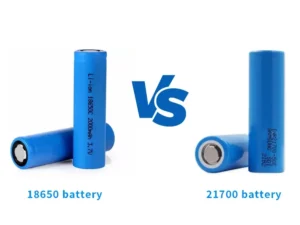Introduction:
The battle between the 18650 VS 21700 battery is a hot topic. These two battery types have distinct features and applications. It caters to various needs. We will find differences, advantages, and considerations for 18650 and 21700 batteries.
What is an 18650 Battery: Compact Powerhouses

The 18650 battery has been a staple in the world of portable electronics. Named for its dimensions, 18mm in diameter and 65mm in length. These cylindrical power cells pack a punch despite their small size. Also, their compact nature makes them ideal for devices with limited space. You can find them in equipment such as laptops, flashlights, and vape mods.
Advantages
- Compact Size: The smaller form factor of 18650 batteries makes them ideal for devices. They go in devices with limited space, such as laptops and other electronic gadgets.
- Portability: Due to their compact size and lighter weight, 18650 batteries are portable. Hence, they are suitable for applications where space and weight are critical considerations.
- Versatility: 18650 batteries are versatile and used in various consumer electronics. It provides a reliable power source for a range of devices.
- Established Technology: The 18650 batteries enjoy established technology and manufacturing processes.
- Cost-Effectiveness: The manufacturing and production costs of 18650 batteries are lower. It contributes to their cost-effectiveness.
Disadvantages
- Lower Capacity: The compact size of 18650 batteries limits their capacity. It leads to shorter battery life in some applications.
- Limited Power Output: For high-power applications, 18650 batteries may have limitations. It is due to their smaller size, impacting their ability to deliver high currents.
- Technology: The established technology is an advantage, but it can also be a limitation. 18650 batteries may not enjoy the latest advancements in energy density and performance.
What is a 21700 Battery: The Power Player

The 21700 battery has gained prominence for its larger size and increased capacity. It has a diameter of 21mm and a length of 70mm. 21700 battery provides more room for active materials. It results in higher energy storage. It makes 21700 batteries the preferred choice for high-performance devices like electric vehicles.
Advantages
- Higher Capacity: The larger size of 21700 batteries allows for increased capacity. It provides more energy storage and longer battery life in high-demand applications.
- Enhanced Power Output: 21700 batteries can handle higher currents. It makes them suitable for devices that have more power, such as electric vehicles.
- Improved Energy Density: 21700 batteries often have higher energy density. They offer more power per unit of volume. The same is helpful for applications where space is not a limiting factor.
- Future Technological Advancements: 21700 batteries have the potential to enjoy ongoing technological advancements. It leads to improvements in performance and efficiency.
- Optimized for High-Performance Devices: The design of 21700 batteries caters to high-performance devices. It provides a balance between power and efficiency.
Disadvantages
- Larger Size: The larger dimensions of 21700 batteries can be a disadvantage. Thus, you should choose after a deep check.
- Cost: 21700 batteries may be more expensive to produce. This impacts the cost of devices using this battery type.
- Limited Availability: The popularity of 21700 batteries is growing. They may not be as available as the more established 18650 batteries in certain markets.
- Charging Infrastructure: Compatibility with existing charging infrastructure can be a consideration. The charging protocols for 21700 batteries may differ from those of 18650 batteries.
18650 battery vs 21700 battery, what’s the difference?

It is crucial to consider their capacity and energy density. The 18650’s smaller size often translates to a lower capacity compared to the 21700. Yet, advancements in technology have led to higher energy. It allows 18650 batteries to store more power.
An important advantage of the 21700 battery VS 18650 is its enhanced energy density. It leads to improved battery life. Devices equipped with 21700 batteries often boast longer usage times and reduced charging. It makes them a popular choice for users seeking extended power on the go.
-
18650 VS 21700 Battery Life: Unveiling the Numbers
The 18650 batteries have a smaller capacity. Also, their efficiency in certain devices can compensate for this difference. For example, these are present in low-power devices like flashlights or remote controls.
But, the 21700 battery’s larger capacity shines in high-demand applications. Electric vehicles, power tools, and other energy-intensive devices have 21700 batteries. It makes them the go-to choice for users prioritizing endurance and reduced downtime.
-
21700 Battery Size VS 18650: Size Matters
The physical dimensions of batteries play a crucial role in device design. The 21700’s larger size provides both advantages and challenges. Devices designed to accommodate 21700 batteries may offer improved performance.
In contrast, the 18650’s compact size allows for versatility in device design. The 18650 battery fits into a variety of products without compromising performance. It includes sleek laptops and slim flashlights. This factor makes the 18650 an attractive option.
-
21700 Battery VS 18650 Battery: Examining the Technical Details
Let us move into the technical aspects. The 18650, with its smaller dimensions, has a lower nominal voltage compared to the 21700. It can impact the power delivery and performance in certain applications.
Moreover, the internal resistance of batteries plays a role in their efficiency. The 18650 may have a higher internal resistance due to its smaller size. The advancements in manufacturing techniques have mitigated this difference to a great extent. Both battery types now offer reliable performance in various scenarios.
Choosing Between 21700 battery vs 18650 battery: Considerations
Choosing between an 18650 and a 21700 battery involves a deep decision-making process. Moreover, these considerations are essential to ensure optimal performance and compatibility. Let us check the key considerations when deciding between these two popular batteries.
1. Device Requirements
Understanding the specific requirements of your device is paramount. It helps in making the choice between an 18650 and a 21700 battery. Different devices have varying power demands and form factor constraints. For smaller devices like flashlights, electronic gadgets, or vape mods, the 18650 works. For larger devices such as electric vehicles power tools, a 21700 battery works better.
Consider the power consumption patterns of your device. Look for both continuous power requirements and any peak power demands. The analysis will guide you toward selecting a battery.
2. Space Constraints
The available space within your device plays a crucial role in the decision-making. The physical dimensions of the batteries are important. With the 18650 being smaller in diameter and length than the 21700, it can impact your choice. If your device has limited space, the compact size of the 18650 battery might be a decisive factor. The devices with the flexibility to accommodate larger batteries may choose the 21700. The reason can be its increased capacity.
It is important to strike a balance between the available space and the desired power output. It ensures that the chosen battery fits into the design of your device.
3. Power and Portability Balance
Finding the right equilibrium between power and portability is often a central consideration. The 18650 battery is more portable and suitable. It helps devices where weight and size are critical factors. Some devices that focus on portability, for example, lightweight electronic gadgets or compact flashlights. They may find the 18650 battery to be the ideal choice.
The 21700 battery offers a higher capacity, providing more power for extended usage. It is useful in devices that need longer battery life and can accommodate the extra size.
4. Charging Infrastructure
The charging infrastructure is another crucial aspect to consider. Different battery types may require specific charging protocols. Also, the availability of compatible charging options can influence your decision. Both 18650 and 21700 batteries generally use lithium-ion technology. However, variations in charging voltages and capacities may cause different charging systems.
Check the compatibility of your existing charging infrastructure with the chosen battery type. Ensure that the charging system aligns with the selected battery. It is important from a battery perspective.
5. Technology
Consider the latest technology advancements in both 18650 and 21700 batteries. Battery technology evolves with continuous improvements. These are energy density, cycle life, and safety features. Thus. Stay informed about the latest developments in both battery types. Make an informed decision that aligns with the current state-of-the-art in energy storage.
Test any innovations that may address specific concerns or limitations. This approach ensures that your choice is not only based on current knowledge. You should also consider the potential benefits of emerging technologies.
6. Environmental Impact
Environmental considerations are important in battery selection. Check the environmental impact of both 18650 and 21700 batteries throughout their lifecycle, from production to disposal. Lithium-ion batteries are famous for their lower environmental impact.
Consider factors such as recyclability and the availability of recycling programs. A sustainable choice aligns with modern environmental consciousness and responsible consumption practices.
Conclusion:
The choice between an 18650 and a 21700 battery depends on the application. The 21700 VS 18650 battery life also matters. Both batteries have their strengths, and manufacturers continue to innovate. It pushes the boundaries of energy storage technology. We can expect even more efficient and powerful batteries to emerge.
